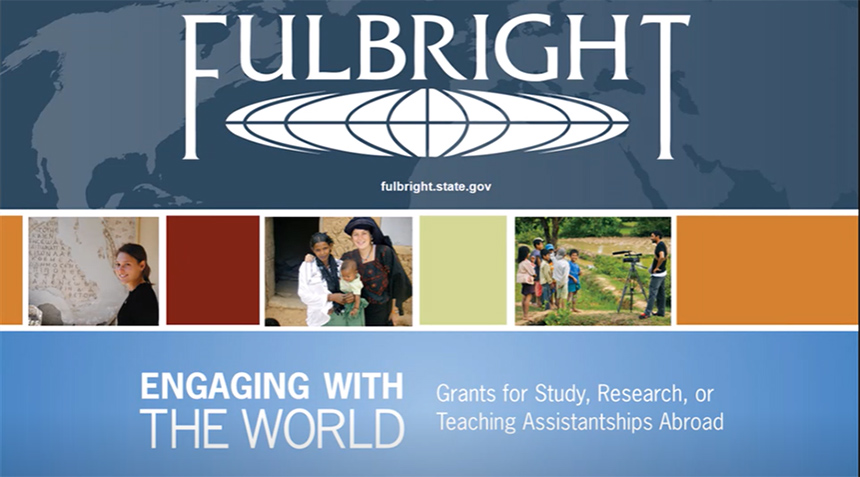Fulbright US Student Program
Each year, nearly 2,000 students across the United States are awarded Fulbright grants to study, pursue independent research, or teach English in more than 140 countries. Fulbright awards are in nearly all fields and disciplines, including creative and performing arts.

About Fulbright Grants
Each year, nearly 2,000 students across the United States are awarded Fulbright grants to study, pursue independent research, or teach English in more than 140 countries. Fulbright awards are in nearly all fields and disciplines, including creative and performing arts.
The goal of the Fulbright Program, sponsored by the U.S. Department of State, is to “increase mutual understanding between people of the U.S. and people of other countries through exchange."
The Fulbright program is looking for applicants who are ambitious, engaging, flexible, culturally sensitive, caring, and diverse. Above all, Fulbright grant winners are expected to be good cultural ambassadors of the United States during the time abroad, and ready to share their host country experience after they return.
If this sounds like the kind of opportunity that you might want to pursue, read through the information available here and then contact a member of the campus Fulbright committee.
Graduating seniors, graduate students, and recent Alfred University graduates are eligible to apply.
Because each Fulbright experience is unique, you must allow plenty of time to prepare an application. Generally, this means beginning the process in the spring in order to meet the fall application deadline.
Graduating seniors who want to go abroad during the year after graduation should begin the process in their junior year and submit an application at the start of their senior year.
Alfred University alumni who have not matriculated at another institution may apply through Alfred University or as 'at large' candidates.
There is no upper age limit. Applicants must be U.S. citizens.
Fulbright grants include round-trip transportation to the host country, and a living allowance for an academic year, based on living costs in the host country. Limited health benefits are also provided. Depending on the host country, grants may also include full or partial tuition, language study programs, book and research allowances, pre-departure and in-country orientations, and enrichment activities.
Generally, applicants will not have spent more than six months in the host country. Applicants must meet any language proficiency required by the host country and must have sufficient language ability to carry out their proposed project.
- Successful English Teaching Assistant applicants will propose a community-oriented project to work on when not assisting in the classroom.
- Graduating seniors and recent bachelor's degree recipients who are applying for a Study/Research grant usually propose projects for which they have undergraduate coursework or direct work or internship experience.
- Graduate students generally propose independent study or research. Depending on the guidelines of the country to which they are applying, this may include the possibility of enrolling in a graduate program abroad.
All applicants should demonstrate knowledge of the host country and a sincere interest in engaging in cultural or community activities that facilitate connections with the local community.
Selection considerations include academic preparation for the project, feasibility of the project proposal, overall fit of proposal with the stated priorities of the host country, leadership ability and flexibility, knowledge of the host country, and foreign language abilities appropriate to the proposed project.
Potential applicants should contact the campus Fulbright advisor as early as possible to indicate interest in applying. Completed applications are due to the campus Fulbright committee by the campus deadline, which falls in early September each year. A campus interview is required for all applicants applying through the University. The completed application is then submitted to the Fulbright U.S. Student Program by the national deadline, which generally falls in mid-October.
Begin by exploring the Fulbright U.S. Student Program website. There you can learn about the two main kinds of Fulbright U.S. Student Grants (Study/Research Grants and English Teaching Assistant Grants) and some other, special opportunities. In submitting an application, you must specify the program and country to which you want to apply.
Begin by exploring the country profiles and getting a sense of the opportunities available. Under each country profile, you can find information about grant periods, candidate profiles, accepted degree levels, foreign language proficiency requirements, types of Fulbright proposal accepted (for example, independent study/research or graduate degree enrollment), required affiliations, and tuition support.
To be successful, applications must be a good fit with the stated interests of the host country. There are opportunities for all sorts of intellectual pursuits, from engineering to business to art, but to find out where these are you have to study the profiles for each country.
You may want to explore the Grantee and Application Statistics pages where you can see how many people applied to each country and how many awards were made for that country.
Once you've learned a little about Fulbright options, contact Ellen Bahr, Alfred University’s Fulbright Program Advisor. She’s happy to answer questions, or to help you begin your Fulbright application!
